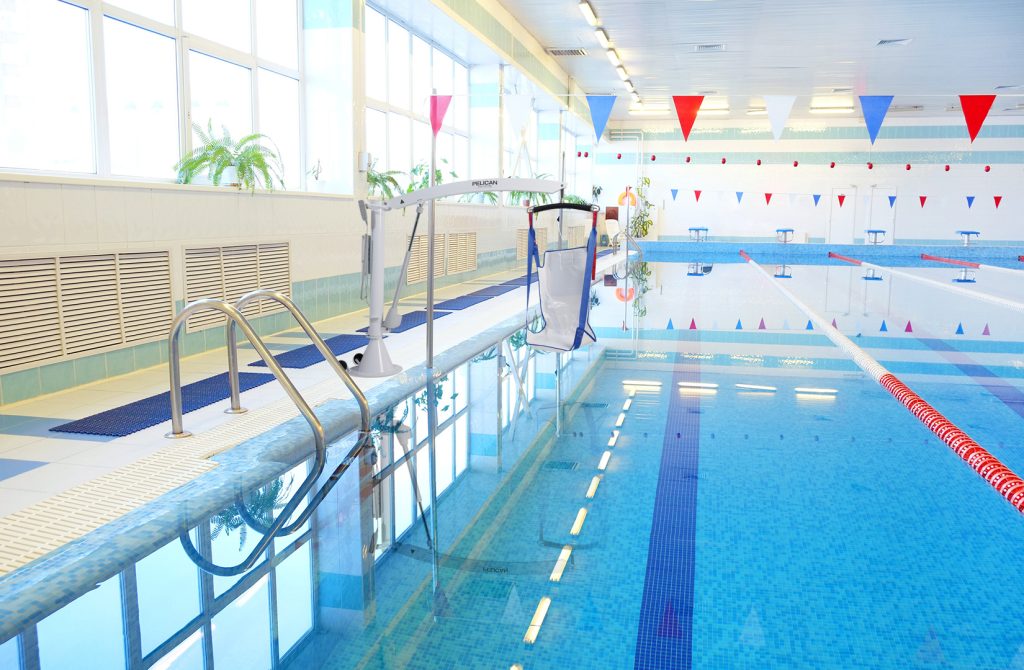In Australia, swimming schools, including private ones, must comply with accessibility laws under the Disability Discrimination Act 1992 (DDA) along with Disability (Access to Premises – Buildings) Standards, 2010. These laws require that swim schools provide equal access to all individuals, regardless of disability, ensuring that their facilities and services are accessible and inclusive.
Key obligations
Physical Access to Facilities
Swim schools must provide physical access for individuals with disabilities including:
- Ramps or pool lifts, such as the Para Mobility Pelican Pool Hoist, for easy entry and exit into the water.
- Accessible parking spaces and pathways leading to the facility.
- Wide doorways and hallways that accommodate wheelchairs.
- Non-slip surfaces and appropriate signage for those with visual impairments.
- Accessible changing rooms and restrooms with features like adult change tables, hoists, grab bars, shower chairs, and wide spaces for maneuverability.
Building Code of Australia (BCA) Access to Swimming Pools
Swim schools must ensure compliance with the Building Code of Australia (BCA), which mandates accessible features in new constructions and renovations of existing structures.
Under the Building Code of Australia (BCA), disability access requirements for buildings consider the accessibility needs based on the size and use of the space. For perimeters around 40m and 70m, access provisions are generally centered on paths of travel, entry points, and interior layout to ensure inclusivity. Features such as compliant sling style lifts, ramps, handrails, and suitable doorway widths are critical. Depending on specific building classifications and usage types, accessible amenities may also be required. Meeting these requirements helps ensure safe, equitable access to facilities for individuals with disabilities. More information can be found here.
Inclusive Swim Programs
Swim schools are encouraged to offer inclusive swimming programs that cater to people with various disabilities. This includes:
- Training staff to support students with special needs.
- Adapting swim lessons to accommodate individuals with physical, sensory, or cognitive disabilities.
- Ensuring staff have knowledge of basic water safety and techniques for assisting disabled swimmers.
Auxiliary Aids and Support
Schools are required to provide auxiliary aids when necessary, including visual or auditory assistance devices, adapted communication methods, or support personnel to help with individual needs.
Non-Discrimination
Swim schools must avoid discriminatory practices in their operations, such as refusing service or providing inferior services to individuals with disabilities. Pricing must also remain consistent, ensuring no financial discrimination for those with additional needs.
Service Animals and Personal Assistance
Swim schools are required to accommodate service animals, and in some cases, allow a carer or personal assistant to attend lessons without additional costs.
Staff Training and Awareness
To ensure compliance, swim schools must train their staff in disability awareness, legal obligations, and specific support techniques to assist people with different types of disabilities.
When ensuring compliance with accessibility requirements in swim schools, it’s important to review local state or territory regulations, as these can vary across Australia. Each jurisdiction may have specific building codes, safety standards, and additional obligations beyond national laws like the Disability Discrimination Act (DDA).
By meeting accessibility obligations, swim schools not only comply with the law but also promote an inclusive environment where everyone can enjoy swimming and improve their water safety skills. This also opens up broader community participation, which can benefit the school’s reputation and reach along with boosting patronage.

